Quotes & Sayings About Symbolism In Literature
Enjoy reading and share 9 famous quotes about Symbolism In Literature with everyone.
Top Symbolism In Literature Quotes
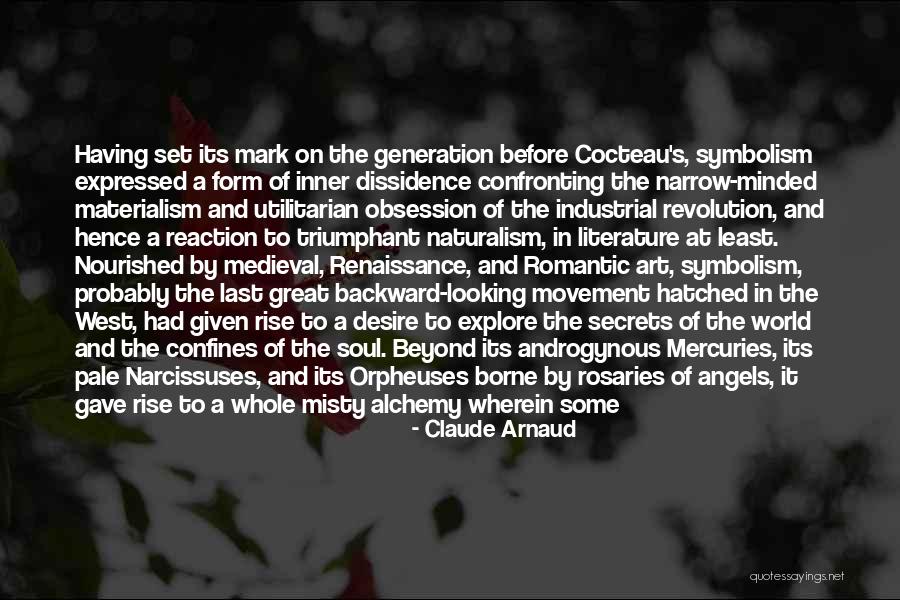
Having set its mark on the generation before Cocteau's, symbolism expressed a form of inner dissidence confronting the narrow-minded materialism and utilitarian obsession of the industrial revolution, and hence a reaction to triumphant naturalism, in literature at least. Nourished by medieval, Renaissance, and Romantic art, symbolism, probably the last great backward-looking movement hatched in the West, had given rise to a desire to explore the secrets of the world and the confines of the soul. Beyond its androgynous Mercuries, its pale Narcissuses, and its Orpheuses borne by rosaries of angels, it gave rise to a whole misty alchemy wherein some found their way into esotericism and even into the religious, since the Universe was only the symbol of another world into which entrance was gained not only through poetry, spiritualism, dreams, and the Ideal, but also via the play of analogies and the study of ciphers. — Claude Arnaud
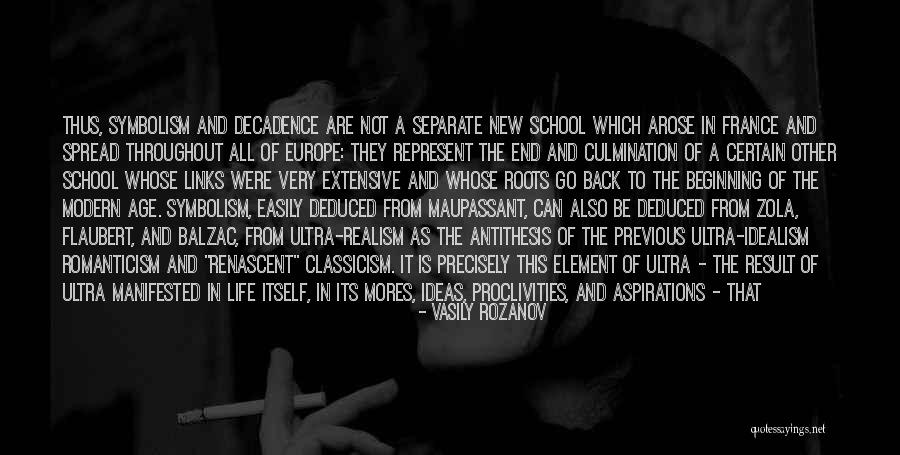
Thus, Symbolism and Decadence are not a separate new school which arose in France and spread throughout all of Europe: they represent the end and culmination of a certain other school whose links were very extensive and whose roots go back to the beginning of the modern age. Symbolism, easily deduced from Maupassant, can also be deduced from Zola, Flaubert, and Balzac, from Ultra-realism as the antithesis of the previous Ultra-idealism Romanticism and "renascent" Classicism. It is precisely this element of ultra - the result of ultra manifested in life itself, in its mores, ideas, proclivities, and aspirations - that has wormed into literature and remained there ever since, expressing itself, finally, in such a hideous phenomenon as Decadence and Symbolism. The ultra without its referent, exaggeration without the exaggerated object, preciosity of form conjoined with total disappearance of content, and "poetry" devoid of rhyme, meter, and sense - that is what constitutes Decadence. — Vasily Rozanov
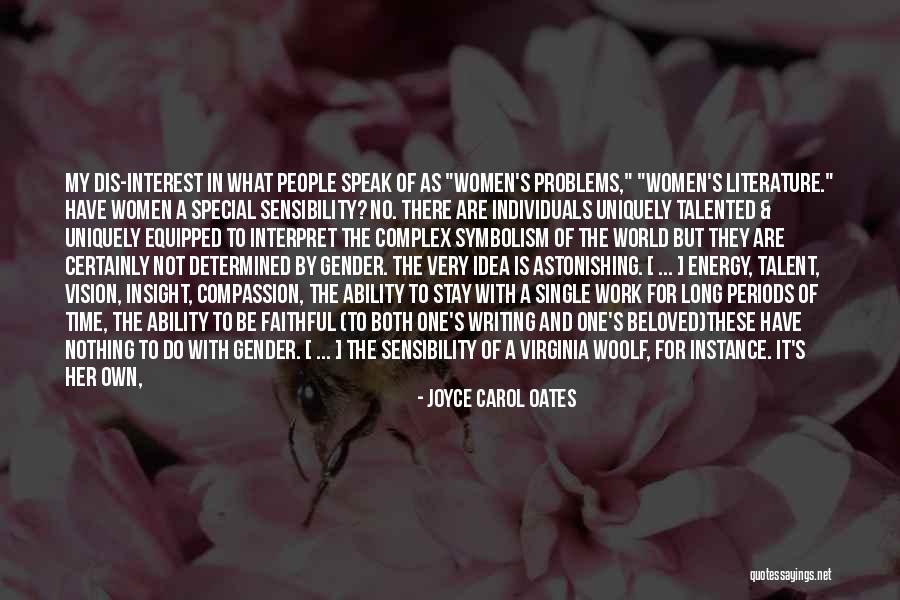
My dis-interest in what people speak of as "women's problems," "women's literature." Have women a special sensibility? No. There are individuals uniquely talented & uniquely equipped to interpret the complex symbolism of the world but they are certainly not determined by gender. The very idea is astonishing. [ ... ] Energy, talent, vision, insight, compassion, the ability to stay with a single work for long periods of time, the ability to be faithful (to both one's writing and one's beloved)
these have nothing to do with gender. [ ... ] The sensibility of a Virginia Woolf, for instance. It's her own, it's uniquely hers. Not because she is a "female" but because she is, or was, Virginia Woolf. Not more sensitive than Henry James or Proust or James Joyce, consequently not more "feminine" in the narrow & misleading sense people use that term today ... But then I suppose critics must have something to write about. [ ... ] — Joyce Carol Oates

Being a literature major, you know, I'm very familiar with the ways symbolism is used in our sort of mythic tales of society, so anyone who is consciously trying to pull that off I think is really interesting and clearly very smart. — Carrie Coon

Like symbolism, decadence puts forth the idea that the function of literature is to evoke impressions and 'correspondences', rather than to realistically depict the world ... the decadent aestheticized decay and took pleasure in perversity. In decadent literature, sickness is preferable to health, not only because sickness was regarded as more interesting, but because sickness was construed as subversive, as a threat to the very fabric of society. By embracing the marginal, the unhealthy and the deviant, the decadents attacked bourgeois life, which they perceived as the chief enemy of art. — Asti Hustvedt

Week before last I went to Wesleyan and read "A Good Man Is Hard to Find." After it I went to one of the classes where I was asked questions. There were a couple of young teachers there and one of them, an earnest type, started asking the questions. "Miss O'Connor," he said, "why was the Misfit's hat black?" I said most countrymen in Georgia wore black hats. He looked pretty disappointed. Then he said, "Miss O'Connor, the Misfit represents Christ, does he not?" "He does not," I said. He looked crushed. "Well, Miss O'Connor," he said, "what is the significance of the Misfit's hat?" I said it was to cover his head; and after that he left me alone. Anyway, that's what's happening to the teaching of literature. — Flannery O'Connor
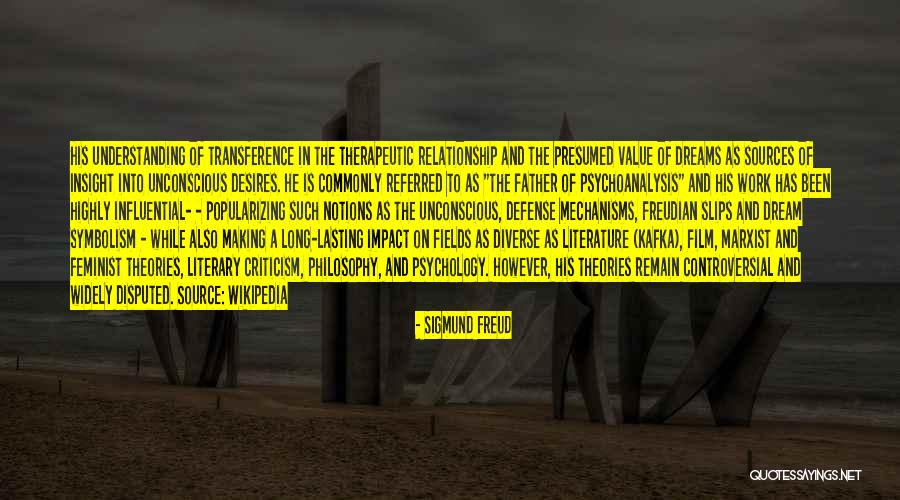
His understanding of transference in the therapeutic relationship and the presumed value of dreams as sources of insight into unconscious desires. He is commonly referred to as "the father of psychoanalysis" and his work has been highly influential- - popularizing such notions as the unconscious, defense mechanisms, Freudian slips and dream symbolism - while also making a long-lasting impact on fields as diverse as literature (Kafka), film, Marxist and feminist theories, literary criticism, philosophy, and psychology. However, his theories remain controversial and widely disputed. Source: Wikipedia — Sigmund Freud

Pull a thread here and you'll find it's attached to the rest of the world. — Nadeem Aslam
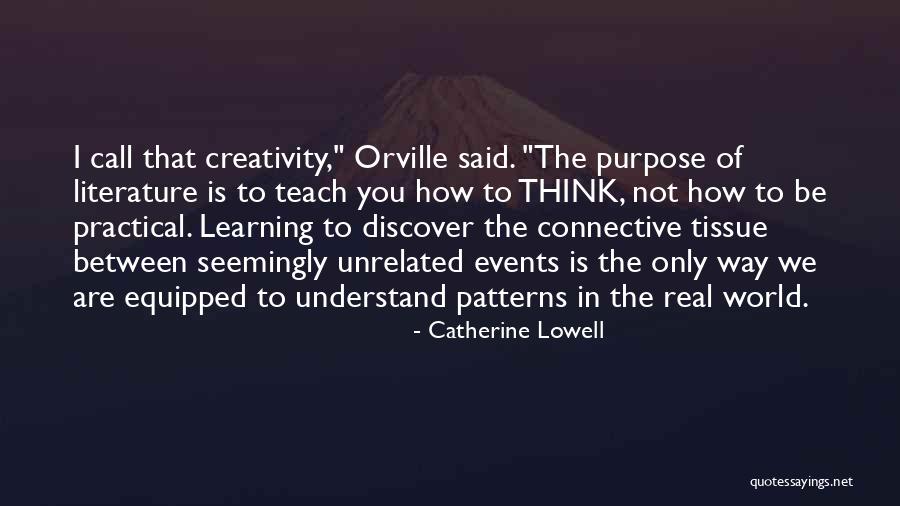
I call that creativity," Orville said. "The purpose of literature is to teach you how to THINK, not how to be practical. Learning to discover the connective tissue between seemingly unrelated events is the only way we are equipped to understand patterns in the real world. — Catherine Lowell





